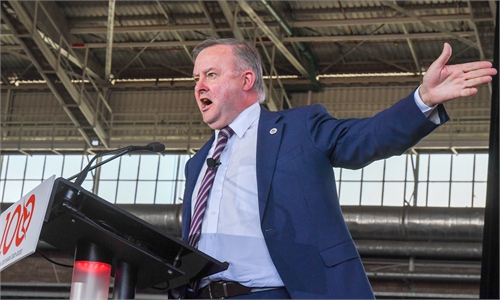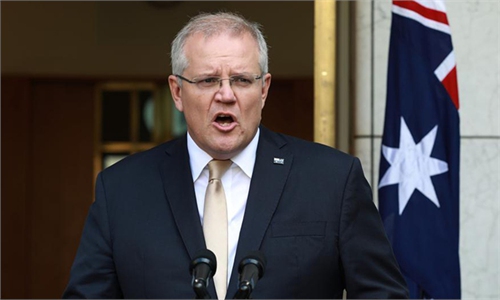
Australian Defense Minister Peter Dutton Photo: AFP
To pursue a favorable position in the upcoming elections by means of showing a hard-line stance and badmouthing China is despicable even for Australian Defense Minister Peter Dutton.
"The US and others acquiesced and allowed the militarization now to the point where China has 20 points of presence in the South China Sea, which does not help stability in the region," Dutton said in an interview with The Sydney Morning Herald on Monday. Dutton added, "If we [Australia] continue on that trajectory, then I think we'll lose the next decade."
Australian federal elections are scheduled in May. "Dutton is a potential rival of incumbent Australian Prime Minister Scott Morrison. With the election looming, Dutton intends to pile some pressure on Morrison, in a bid to gain more political capital. Dutton challenged former Australian prime minister Malcolm Turnbull in 2018. Although the attempt failed, his ambition to become prime minister still remains. He may harbor thoughts of becoming the next Liberal leader, replacing Morrison," Chen Hong, a professor and director of the Australian Studies Center of East China Normal University, told the Global Times.
In recent years, to pursue their political gains, some Australian anti-China forces have repeatedly fabricated the so-called China threat theory. Such practices have deceived the Australians and have led China-Australia relations to a freezing point. Dutton, a representative of China hawks in Australia, has repeatedly made tough and noisy remarks against China especially since he was sworn in as the minister for defense in March 2021. By virtue of these lines, he has gained much attention both at home and aboard. So far, he tends to treat making hard-line words toward China, hyping the China threat theory, and provoking China as a means to fish for political capital, which is very contemptible.
Dutton's ambition to become the next prime minister will encourage him to act more desperately on China-related issues. He has prioritized his own political interests over China-Australia relations as well as Australia's national interests. As a result, ties between Beijing and Canberra will be the victim of his political interests.
Furthermore, when reporting on Dutton's rhetoric, some Western media outlets mentioned the background of the US Secretary of State Antony Blinken's trip to Australia this week, Chen said. By hyping the so-called China threat theory, Dutton also hopes to provoke the US into ramping up its confrontation with China amid Blinken's visit. His lines embodied Australia's strategic frustration and anxiety.
Since some Australian politicians adhere to provoking disputes with China, relations have plummeted, official exchanges have almost disappeared, and their economic and trade relations have also been affected. But the US, which Australia heavily relies on in its China policy, still continues exchanges between top officials with China. And trade between China and the US reached a record high in 2021. Against this backdrop, Australia is very worried that the US will discard it one day. As a result, it deliberately stirred up trouble in an attempt to urge the US and other allies to confront China.
But Blinken seems to put more weight on the Quad foreign ministerial meeting in his visit to Australia. And Dutton's tough lines on China will have little effect on the US, as Washington's China policy is consistent, and will not change because of what Dutton said.


